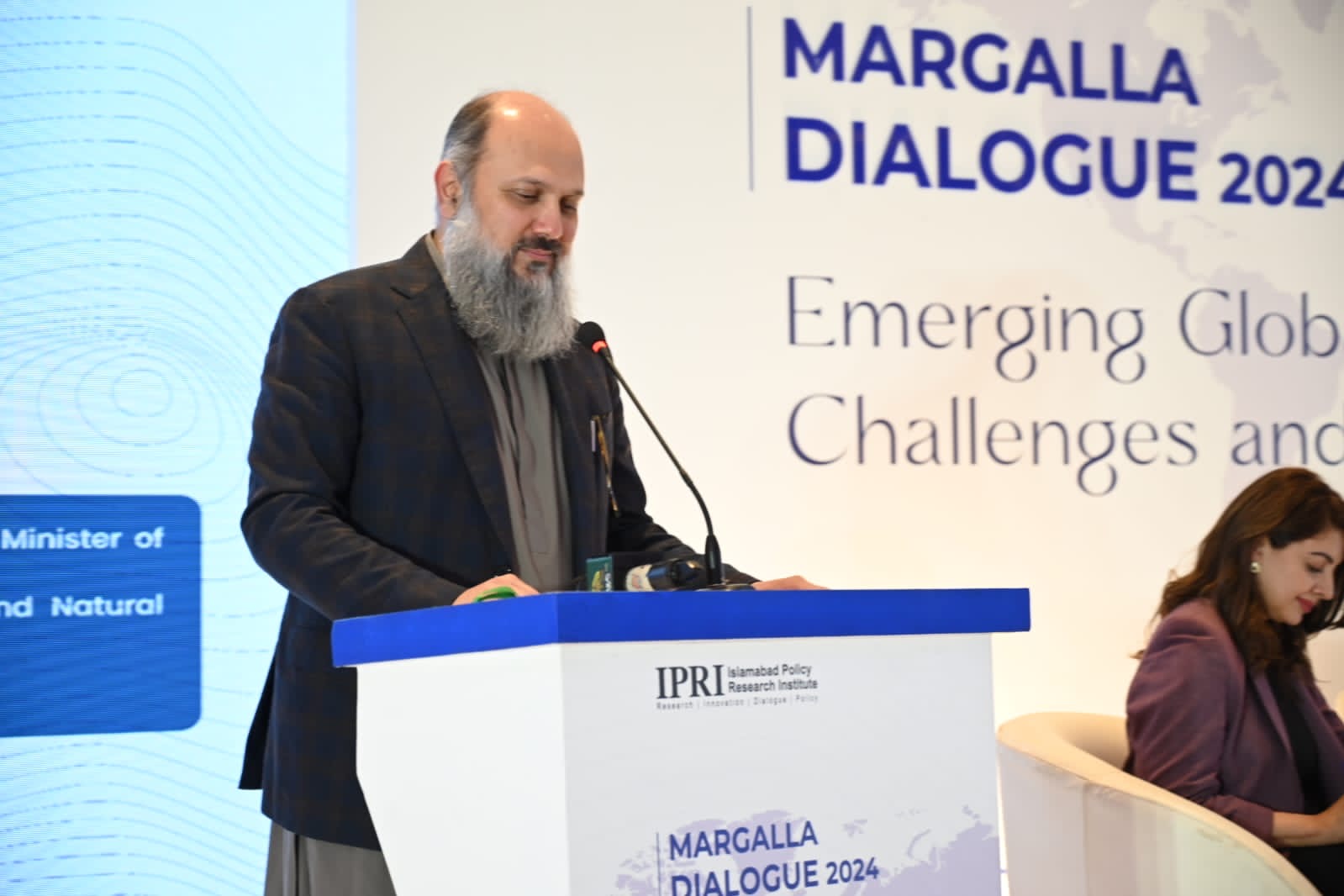 14 Nov 2024, ISLAMABAD: The second-day of Margalla Dialogue 2024 deliberated on two critical themes, namely “Age of Technology: Exploring New Horizons,” and “Reforming Governance and Human Security in Pakistan”.
14 Nov 2024, ISLAMABAD: The second-day of Margalla Dialogue 2024 deliberated on two critical themes, namely “Age of Technology: Exploring New Horizons,” and “Reforming Governance and Human Security in Pakistan”.
Jam Kamal Khan, Federal Commerce Minister and former chief minister of Balochistan, while addressing the session on Reforming Governance and Human Security, said that an eco-system to address situations has not been evolved over the decades, especially in Balochistan.
He said that every situation is dealt with in a haphazard manner, impacting the problem at hand in a detrimental manner. “Unless we go deep into society, nothing will help in approaching the issue while sitting and governing the far-flung areas from Islamabad.”
Jam said that Balochistan has not been able to create space for it politically in the mainstream owing to its numerical strength, and at the same time elected legislators due to their minimal reach were compromised.
“As political parties in the province have a limited reach, coalition government is the order of the day leading to extreme fragmentation and instability, making interest of legislators focused to their vested interests. This has led to deprivation on two counts, one owing to geographical remoteness and second political apathy,” he remarked.
Thus the issues are non-development, law and order, and economic stagnation, the former CM Balochistan pointed out.
He said that the way out is to build a new eco-system that delivers and represents the people, but the question remains who will do it?
He cautioned that modern technology and communication has transformed the landscape of Balochistan, and people are aware and capable of making decisions. “Thus, we do not have enough time to sit back and keep thinking,” he warned.
Sabina Durrani said that the NFC Award is at the root of problem because it is derived on population, and Balochistan is an obvious victim in it owing to its meagre numerical strength, and is in need of being revisited to stabilise national security and growth.
Corruption in bureaucracy, and among politicians is eating into vitals as there is no transparency, said Shakil Durrani.
The panel was moderated by Sidra Iqbal, Broadcast Journalist, Aaj TV, Pakistan; and the keynote address was delivered by Jam Kamal Khan, Federal Minister for Commerce. Other speakers were Shakil Durrani, Executive Director, Society for the Promotion of Engineering Sciences and Technology, Pakistan. who apoke on “Governance and Bureaucratic Reforms,” Prof. Dr. Shahzad Ali Khan, Dean & Vice-Chancellor, Health Services Academy, Pakistan, discussed the fine-print of “Health and Social Security,” Sakib Sherani, CEO, Macro Economic Insights, Dr. Claudia Milena Adler, Lecturer, International Humanitarian Affairs, University of York, UK, and Dr. Sabina Imran Durrani, Chief, Population and Social Planning Section, Ministry of Planning, Development and Special Initiatives (Population) were other prominent on the panel.
The panel discussion on “Technology” was moderated by Dr. Basit Riaz, CEO Forloops, Pakistan; and Alex Gladstein, Chief Strategy Officer at Human Rights Foundation, USA, was the keynote speaker. Dr. Gao Xudong, Professor, School of Economics and Management, Tsinghua University, China, spoke on “Developing Emerging Technologies and the Role of East,” Brig Dr Raashid Wali Janjua (Retd), Director, Research & Analysis IPRI, reflected on the “Impact of Technology on Warfare,” Iva Gumnishka, Founder, Humans in the Loop, Czech Republic, highlighted the dynamics of “AI Regulations/ Autonomous Weapons,” and Daniel Castro, Vice-President, Information Technology and Innovation Fund, USA, outlined the critical strides of “Emerging Technologies and their Impact on National Security and Economy.”
Brig (retd) Dr Raashid Wali Janjua spoke on the impact of technology on future warfare in third session of Margalla Dialogue. According to him the astounding advances in technologies like Artificial Intelligence and Quantum Computing were transforming warfare wherein the entire grammar and logic of the war was changing. For the first time in human history the human agency was taken out of the loop upending the whole nature of the war. The Clausewitz’s trinity of war was no longer the ruling war paradigm as non-state actors and emerging technologies like Lethal Autonomous Weapons, Space Warfare, AI enabled weapons, and Brain-Computer Interface were increasing the tempo of warfare beyond human control. The world, therefore, needs to bring IHL in sync with AI warfare and to evolve a global consensus for an AI arms control treaty.
The panel was of the view that Artificial Intelligence (AI) is transforming everything as we live in an age of Meta, Google, and where language proficiency of AI is making strides in healthcare too.
It was noted that it is going to cause massive job displacement, and call center industry may be numbered in years to come.
They said that AI is going to create ripples in human development and impact the very existence of humanity.
The panel talked at length on the new financial fiefdom of Bitcoin and believed that it is gradually catching attention and the way to go.Bitcoin is seen as an enabler in creating open societies.
AI in warfare is a big question, and the panel threw light in it too.
Margalla Dialogue 2024, is a flagship interactive high-caliber intellectual discourse of Islamabad Policy Research Institute (IPRI), which opened on Monday at Marriott Hotel, Islamabad. The two-day international conference will deliberate on the theme, “Emerging Global Realities: Challenges and Response,” andwill have Four Forums along with special sessions on International Law and Economics.
Sub Editor: Ghufran